Changan Automobile
Chang'an Automobile (Group) Co., Ltd.[1] is a Chinese automobile manufacturer headquartered in Chongqing, China, and a state-owned enterprise.[2] Its principal activity is the production of passenger cars, microvans, commercial vans and light trucks.[3]
 | |||||||
| State-owned | |||||||
| Industry | Automotive | ||||||
| Founded | 1862 | ||||||
| Headquarters | , China | ||||||
Area served | Worldwide | ||||||
| Products | Motor vehicles | ||||||
| Owner | China South Industries Group | ||||||
| Subsidiaries | Changan UK R&D Centre Ltd. | ||||||
| Chinese name | |||||||
| Simplified Chinese | 重庆长安汽车股份有限公司 | ||||||
| Traditional Chinese | 重慶長安汽車股份有限公司 | ||||||
| |||||||
| Website | changan.com.cn | ||||||
Chang'an designs, develops, manufactures, and sells passenger cars sold under the Chang'an brand and commercial vehicles sold under the Chana brand. It operates joint ventures with Ford (Changan Ford), Groupe PSA (Changan PSA), Mazda (Changan Mazda) and Suzuki (Changan Suzuki) which respectively produce Ford, DS Automobiles, Mazda and Suzuki branded passenger cars for the Chinese market. It also has a joint venture with Jiangling Motor Corporation Group (JMCG) and Aiways, which produces SUVs sold under the Landwind marque.
Chang'an is considered to be one of the "Big Four" Chinese automakers (along with SAIC Motor, FAW Group, and Dongfeng Motor Corporation),[4] and manufacture of 3 million units in 2016 saw the company rank fourth among China's automakers by production volume.[5] It is China's second most popular car brand, with 1.4 million Changan cars sold in 2016.[6] A subsidiary of Changan, Chongqing Changan Automobile Company (SZSE: 000625), is listed on the Shenzhen Stock Exchange (but is also state controlled).[2]
History
Changan's early origins can be traced back to 1862 when Li Hongzhang set up a military supply factory, the Shanghai Foreign Gun Bureau.[7] In 1937, during the Sino-Japanese War, the factory was moved to Chongqing when Shanghai was attacked.[8]
In 1959 a predecessor entity, Chongqing Chang'an Arsenal, under contract to the government, began auto manufacturing and built Changjiang Type 46 vehicle which was the first production vehicle of China.[9] Changan introduced minicar by licensing from Suzuki.[10]
In 2009, Changan acquired two smaller domestic automakers, Hafei and Changhe.[11] In 2013, Changhe was transferred to Jiangxi provincial government for restructuring, and later became a majority-owned subsidiary of another Chinese automaker BAIC Group.[12]
As of 2010, China Weaponry Equipment is the parent company of this state-owned automaker,[13] and that year Chang'an became the fourth most-productive car manufacturer in the Chinese automobile industry by selling 2.38 million units.[14]
The company also released a new logo for its consumer offerings in 2010 while commercial production retains the former red-arch brand.[3]
Although it only allowed the company to achieve fourth place among domestic automakers in terms of production, Changan made over 2 million whole vehicles in 2011.[15]
In 2012, it was reported that 72% of production was dedicated to passenger vehicles,[5] but this count likely conflates private offerings and microvans, tiny commercial trucks and vans that are popular in China.
In November 2012, Changan Ford Mazda Automobile was divided into two new joint venture companies: Changan Ford and Changan Mazda.[16]
Changan will end sales of gasoline and diesel vehicles under its brand in 2025.[17]
Products
Changan designs, develops, manufactures, and sells passenger cars sold under the Changan brand and commercial vehicles sold under the Chana brand.
Current Changan models
The Changan range currently includes the following models:[18]
- Alsvin V7
- Changan Benni
- Changan Benni EV
- Changan CS15
- Changan CS15 EV
- Changan CS35
- Changan CS35 Plus
- Changan CS55
- Changan CS75
- Changan CS75 Plus
- Changan CS85
- Changan CS95
- Changan Alsvin
- Eado DT
- Eado
- Eado Blue (Hybrid version of the Eado)
- Eado EV[19]
- Eado XT (Hatchback version of the Eado)
- Eado XT RS (Sport version of the Eado XT)
- Changan Linmax
- Changan Raeton
- Changan Raeton CC (Redesigned sportier version of the Raeton)
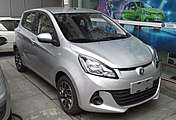 Chang'an Ben Ben
Chang'an Ben Ben.jpg) Chang'an Alsvin (Third Generation)
Chang'an Alsvin (Third Generation) Chang'an Eado DT (Alsvin V7 facelift)
Chang'an Eado DT (Alsvin V7 facelift)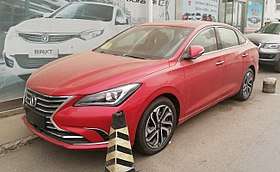 Chang'an Eado
Chang'an Eado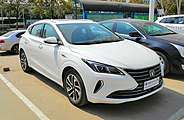 Chang'an Eado XT
Chang'an Eado XT Chang'an Linmax
Chang'an Linmax Chang'an Raeton
Chang'an Raeton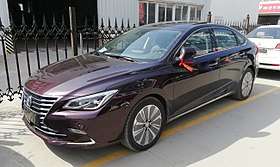 Changan Raeton CC
Changan Raeton CC Chang'an CS15
Chang'an CS15 Chang'an CS35
Chang'an CS35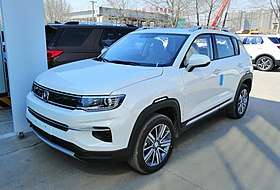 Chang'an CS35 Plus
Chang'an CS35 Plus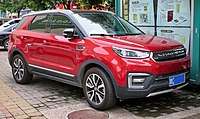 Chang'an CS55
Chang'an CS55%2C_rear_8.13.18.jpg) Chang'an CS75
Chang'an CS75.jpg) Chang'an CS75 Plus
Chang'an CS75 Plus Chang'an CS85 Coupe
Chang'an CS85 Coupe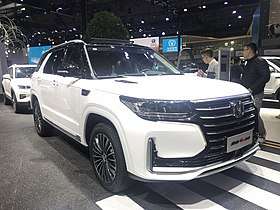 Chang'an CS95
Chang'an CS95
Discontinued Changan models
- Alsvin Hatchback
- Alsvin Sedan
- Alsvin V3
- Alsvin V5
- Benni Love (Extended production version of the first-generation Benni)
- Benni Mini (Extended production version of the second-generation Benni)
- CX20 (Now built by Youngman Lotus)
- CX30 Hatchback
- CX30 Sedan
- E30 EV
- Changan SC6320G/SC1011 (rebadged Suzuki Carry vans and trucks)
- Joice (Jiexun)
- Joice HEV (Hybrid electric version of the Joice, out of production within one year of market launch)[20]
- Z-Shine
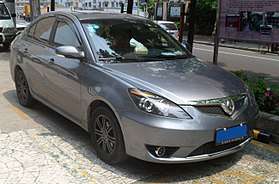 Chang'an Alsvin
Chang'an Alsvin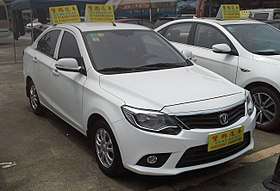 Chang'an Alsvin V3
Chang'an Alsvin V3 Chang'an Alsvin V5
Chang'an Alsvin V5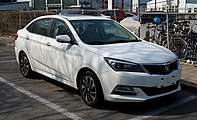 Chang'an Alsvin V7
Chang'an Alsvin V7 Chang'an CX20
Chang'an CX20 Chang'an CX30 Hatchback
Chang'an CX30 Hatchback- Chang'an CX30 Sedan
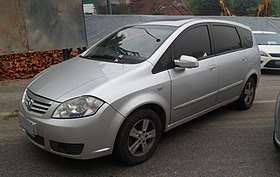 Chang'an Joice (Jiexun)
Chang'an Joice (Jiexun)
Current Oushan (Ossan) models
.jpg) Oushan COS1°
Oushan COS1°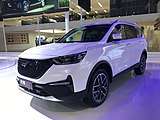 Oushan COS1° GT
Oushan COS1° GT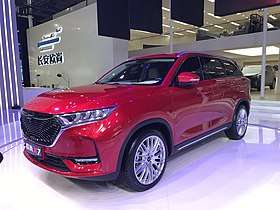 Oushan X7
Oushan X7 Oushan Cosmos
Oushan Cosmos
Current Kuayue models
- Kuayuewang
- Xinbao Mini
- Xinbao T3
- Chana V3
- Chana V5
 Kuayue Kuayuewang
Kuayue Kuayuewang Kuayue Chana V3
Kuayue Chana V3
Current Chana (Oushang) models
- X70A
- CX70
- CX70T
- A800
- A600 (Originally Changan Oushang)
- Honor (欧诺)
- Star 5 Truck
- Star 3
- Star 9
- T20
- F30
- F70
 Chana X70A
Chana X70A Chana CX70
Chana CX70 Chana CX70T
Chana CX70T Chana Honor
Chana Honor Chana Oushang A800
Chana Oushang A800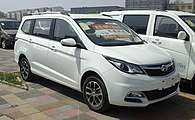 Chana Oushang A600
Chana Oushang A600 Chana Eulove EV
Chana Eulove EV
Discontinued Chana models
- CM7
- CM8
- Eulove
- Ruiline
- Shenqi T20 / Q20
- Star
- Chana Star 2
- Chana Star 4500 (Later renamed to Chana Star 9)
- Chana Star S460
- Taurustar (Later renamed to Chana Star 7)
- Chana Taurustar
_Eulove%2C_front_8.6.18.jpg) Chana Eulove
Chana Eulove%2C_front_8.4.18.jpg) Chang'an (Chana) Shenqi
Chang'an (Chana) Shenqi%2C_front_8.3.18.jpg) Chana Star
Chana Star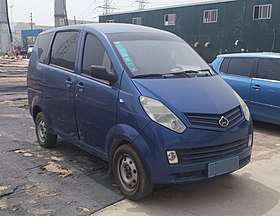 Chana CM8
Chana CM8
Current Ruixing models
- Ruixing S50/Ruixing S50V
- Ruixing M70
- Ruixing M80 (Changan G10)
- Ruixing M90
 Chana Ruixing S50V
Chana Ruixing S50V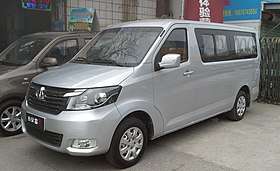 Chana Ruixing M90
Chana Ruixing M90_Ruixing_M80_front_8.16.18.jpg) Chana Ruixing M80
Chana Ruixing M80 Chana Ruixing M70
Chana Ruixing M70
Electric vehicles
After six years of R&D, Changan debuted a hybrid automobile in 2007.[2] China subsidizes oil, an incentive for the use and manufacture of electric cars, and Chinese automakers see opportunities in less mature electric vehicles because Western companies have yet to develop much of a lead in the technology.[21]
Production and research facilities
Domestic
Changan has four major production bases (in the City of Chongqing, Hebei province, Jiangsu province, and Jiangxi province), eleven automobile production bases, and two engine production bases in mainland China[22] for a more-current total of 21 vehicle-making bases including newer sites in Anhui province, Guangdong province, Heilongjiang province, Shandong province, and Shanxi province.
Anhui
A planned 300,000 units/year capacity mini-vehicle production base in Hefei, Anhui province, should see completion in 2011. Production capacity figures may consider engines and vehicles as discrete.
Beijing
An existing R&D center in Beijing[23] will soon be joined by a passenger car production base in Fangshan District, Beijing, which will become operational in 2012.
Chongqing
Chang'an has numerous sites in the city of Chongqing. A Chang'an-Ford plant and another, planned Chang'an-Ford plant (which may produce engines[24]) are joined by a Chongqing-based R&D center[23] and an industrial park in Yubei, Chongqing.
Hebei
An industrial park in Hebei province may continue to be Chang'an controlled.
Heilongjiang
A Harbin, Heilongjiang province, R&D center, is now a Chang'an asset.[23] It may have been owned by Hafei prior.
Jiangsu
A Chang'an-Ford plant and an industrial park in Nanjing, Jiangsu province, may comprise Chang'an operations in this province.
Jiangxi
A planned Chang'an commercial vehicle production base in Nanchang, capital of Jiangxi province, will produce JMC and Ford-branded vehicles[24] and join an R&D center[23] as a second facility in this province. The latter facility may be a former Changhe asset.
Shanghai
Chang'an has an R&D center in this coastal city.[23]
International
The company maintains four factories in international markets and several overseas R&D centers. Chang'an had an assembly plant in Poteau, Oklahoma, piecing together products sold under the Tiger Truck brand from 2007 to 2010.[25] The Changan CS35 is built in Lipetsk region of Russia since 2016.[26]
Karachi
Changan has built a production facility in Karachi Pakistan with an investment of US$100 million. This plant will make right hand drive passenger vehicles for Pakistan as well other right hand drive markets. First Made in Pakistan unit of Changan rolled out on 2 May 2019. With a manufacturing capacity of 30,000 cars per year this facility will be Changan's first to produce right hand drive cars.
R&D centers
Chang'an has over 7,000 engineers and researcher working in R&D facilities in Chongqing, Beijing, Shanghai and Harbin,[7] Turin, Italy,[23] and Yokohama, Japan.[23] It set up two more in 2011. These are located in Birmingham (originally was set up in Nottingham), United Kingdom, and Detroit, United States.[27] The Detroit center opened in early 2011, and its office was moved from Nottingham to Birmingham 2015.[28][29]
Joint ventures
Like most major Chinese automakers, Changan partners with Western and Japanese companies to produce and sell the products of these foreign firms in China. Changan currently participates in the following joint ventures: Changan Suzuki (1993–2018),[30] Changan Ford (2001–present),[9] Chang'an Ford Mazda Engine (2005–2012),[31] Changan PSA or CAPSA (2010–present),[32] and Changan Mazda (2012–present).[33]
Jiangling Motor Holding Co. Ltd. (Chinese: 江西江铃控股有限公司; pinyin: Jiāngxī Jiānglíng Kònggǔ Yǒuxiàn Gōngsī), also known by the initialism JMH, was a joint venture established in October 2004 and controlled equally by Changan and JMCG. To create Jiangling Motor Holding Changan invested money and in exchange JMCG transferred its Jiangling Motors Corporation (JMC) equity to the venture. Jiangling Motor Holding was the largest shareholder of JMC,[34] with a 41.03% stake as of March 2018.[35] JMH also owned the Landwind marque.[34][36]
In April 2019, it was announced that JMCG and Changan planned to split JMH into two separate companies: one keeping the same name and other tentatively called Jiangling Investment. Jiangling Investment would hold the 41.03% JMC stake and some liabilities and would still be equally owned by Changan and JMCG. The new JMH would own the rest of the former JMH assets (including Landwind)[37][38] and it would issue 100% more shares to be sold to investors, leaving JMCG and Changan with a 25% stake each.[38] Jiangling Investment was formally established in May 2019, completing the split of the former JMH.[39] In June 2019, it was announced that the investor for the new JMH was the car manufacturer Aiways. Aiways acquired a 50% of the new JMH with the aim of securing production permits for new energy vehicles.[40][41]
Changan Ford
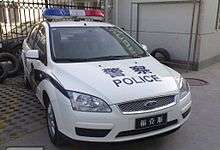
In 2001, Chang'an Ford was formed[42] and initially built Ford-branded passenger vehicles from complete knock down kits.
Making Chinese-market versions of Ford consumer offerings,[3] its 2010 dealer network was thought to include many showrooms in second- and third-tier Chinese cities such as Chongqing.[43] So-called second- and third-tier cities are large and medium-sized cities not among the top four in terms of population and contribution to GDP.[44]
Changan PSA

Changan and the French car manufacturer PSA Peugeot Citroën agreed in 2010 to set up a 50/50 passenger car and light commercial vehicle-making joint venture.[45] Named CAPSA, it is the PSA Group's second joint venture company in China, after Dongfeng Peugeot-Citroën Automobile, and its first with Chang'an.[46] Centering on a newly built production base in Shenzhen, it is estimated that initial production capacity for the project will be 200,000 units/year.[47]
Manufacturing commenced in 2014, with China specific Citroën DS models; the DS 5LS first and then the DS 6WR.[48]
Changan Suzuki
.jpg)
Technical and commercial cooperation with Suzuki Motors, beginning in 1983, saw Changan assembling inexpensive commercial trucks (originally the Suzuki Carry ST90 as the Chang'an SC112[49]) under license into the 2000s.[50] The two companies formed Chongqing Chang'an Suzuki Automobile Co in 1993,[42] which built licensed versions of the Suzuki Alto, Suzuki Cultus, and more recently the Swift.
In parallel with its Suzuki joint venture, Changan also continued to build small trucks and vans for commercial use based on the 1999 Suzuki Carry license, but independently developed vehicles are quickly replacing them.[50] These small cars carry the Changan brand name although Suzuki technology is used in their design and manufacture.
In 2010, Changan was supposed to merge its Suzuki joint venture with that of Changhe, another automaker that participates in a project with the Japanese company.[13] This plan, supported by Suzuki, did not see fruition, and this Japanese company may currently be unhappy with its Chinese partners. Despite being an early entrant in the Chinese auto market, it has lackluster sales in the country.[51] Suzuki's efforts to change the situation by merging its two joint ventures—since Chinese business law does not allow any foreign company more than two—have so far been stymied by its Chinese partners, who instead hope Suzuki will improve their situation.[52] The Chinese State may also not want new foreign-Chinese joint auto-making ventures at this time.[53] An effort to sell the entire Suzuki model range at unified dealerships fell through in 2008.[54] (This may have been tried again in 2010.)[55]
References
- Chana > Contact Us > Dealer Application Chana Official Site (Web Archive)
- China rolls out own hybrid car reuters.com, Sat December 15, 2007 1:44am EST
- China's Changan unveils new car logo in brand drive reuters.com, Sun October 31, 2010 11:55am EDT
- New policy to encourage China's carmaker consolidation xinhuanet.com, 2010-02-22 10:27:20
- "2012年12月分车型前十家生产企业销量排名". China Association of Automobile Manufacturers (CAAM). 14 January 2013. Archived from the original on January 15, 2013. Retrieved January 15, 2013.
- https://www.wsj.com/articles/major-chinese-car-maker-plans-electric-only-future-1508414743
- TABETA, SHUNSUKE (8 Feb 2017). "Changan Auto sells 3m cars in record year". The Nikkei Asian Review. Retrieved 20 January 2018.
- Xu, Xiao; Han, TianYang (3 Dec 2012). "Colorful history, ambitious goals for Chang'an Auto". The China Daily.
- "Changan About us". Retrieved 20 January 2018.
- Gallagher, Kelly Sims (2006). China Shifts Gears: Automakers, Oil, Pollution, and Development. The MIT Press. pp. 88. ISBN 9780262072700.
- For purchase of Hafei, see New policy to encourage China's carmaker consolidation xinhuanet.com, 2010-02-22 10:27:20
- For purchase of Changhe, see Year in review: A memorable 2009 saw China's ascent to top of global vehicle market chinadaily.com.cn, 2010-04-24
- "BAIC takes majority stake in Changhe Auto". China Daily. 26 November 2013.
- Milestone merger reshapes Suzuki chinadaily.com.cn, 2010-03-29 09:26
- China Car Market 101: Who Makes All Those 18 Million Cars? thetruthaboutcars.com, January 19, 2011
- 2011年前十家乘用车生产企业销量排名. China Association of Automobile Manufacturers (CAAM). 2012-01-20. Archived from the original on 2012-08-20.
- "Restructure of Changan Ford Mazda Automobile Approved". Mazda. 30 November 2012. Retrieved 3 March 2014.
- https://asia.nikkei.com/Business/AC/China-s-Changan-steers-toward-electric-future
- "Chinese Brands". China Auto Web. Retrieved 3 March 2014.
- DE FEIJTER, Tycho. "Changan Eado EV will hit the Chinese car market in December". ChinaCarNews.com. ChinaCarNews. Retrieved 8 March 2015.
- "New energy vehicle sales in China disappoint automakers".
- For fuel subsidy, see China's fuel subsidy costs the world reuters.com, Wed Jun 4, 2008 8:08am EDT
- For Chinese automakers seeing EV opportunities, see Big bet on better battery-run cars chinadaily.com.cn, 2011-01-03
- "Company Portrait". CHANA International Corporation. Archived from the original on 21 May 2010. Retrieved 21 September 2013.
- "Changan Auto Group opens three new R&D centers". Gasgoo Automotive News. Gasgoo.com. April 20, 2010. Retrieved 21 September 2013.
- Ford posts 40% sales increase in 2010 chinacartimes.com, January 7, 2011
- Simpson, Susan (October 8, 2010). "Tiger Truck closing Poteau plant". NewsOK.
- "Production Of Changan CS35 Started In Lipetsk Region". Wroom.ru. Archived from the original on 2016-10-01. Retrieved 2016-10-01.
- For Birmingham center, see "Chinese car maker to create 200 new jobs in Nottingham". East Midlands Development Agency. Archived from the original on 2011-07-18. Retrieved 2011-02-02.
- For Detroit center, see "China's Changan Auto to set up Detroit R&D centre -Xinhua". reuters.com. Thomson Reuters. 2010-06-30. Retrieved 21 September 2013.
- "Changan UK R&D Center website". Changan UK R&D Center, Inc. n.d. Archived from the original on 2018-08-17. Retrieved 1 November 2018.
- "Changan USA R&D Center Set Up in Detroit". changanus.com. Changan US R&D Center, Inc. 18 January 2011. Archived from the original on 13 December 2013. Retrieved 27 September 2013.
- "Suzuki Forced Out of China as Buyers Continue to Favor SUVs". Bloomberg. 4 September 2018. Retrieved 21 February 2020.
- "Changan Ford Mazda Engine Celebrates One Millionth Engine Milestone". @FordOnline. Ford Motor Company. Mar 6, 2013. Retrieved 22 September 2013.
- Peugeot and Changan Automotive finalise joint venture bbc.co.uk, 11:04 GMT, Friday, 9 July 2010
- "China approves Ford, Mazda, Changan to split JV in two: Ford CEO". Reuters. 27 August 2012. Retrieved 1 May 2015.
- 江铃控股详细资料 [Jiangling Holding details]. auto.ifeng.com (in Chinese). Retrieved 1 February 2019.
- "Jiangling Motors Corporation, Ltd. 2017 Annual Report" (PDF). JMC. pp. 27, 29. Retrieved 1 February 2019 – via Sohu.
- "Landwind". JMCG. Retrieved 1 February 2019.
- Hu, Xinyu (3 April 2019). 江铃汽车控股股东拟变更为江铃投资 [Jiangling Motors' controlling shareholder is planned to be changed to Jiangling Investment]. jrj.com.cn (in Chinese). Retrieved 3 April 2019.
- Liu, Yang; Zhen, Zhenyu (3 April 2019). 长安汽车拟为江铃控股引入战略投资者 [Changan Automobile intends to introduce strategic investors for Jiangling Holding]. finance.sina.cn (in Chinese). Retrieved 3 April 2019.
- Jian, Jianru (30 May 2019). Zhang, Bei (ed.). 江铃汽车和长安汽车共同成立投资公司 注册资本10亿元 [Jiangling Group and Changan Automobile jointly established an investment company with a registered capital of 1 billion yuan]. nbd.com.cn (in Chinese). Retrieved 7 June 2019.
- Li, Xing (5 June 2019). 爱驰汽车购入江铃控股50%股权 首款量产车已开始生产 [Aiways acquired a 50% equity in Jiangling Holdings. The first production car has started production]. finance.sina.cn (in Chinese). Retrieved 7 June 2019.
- Xing, Lei (6 June 2019). "AIWAYS Acquires 50 Percent Stake In Jiangling Holding For Nearly ¥1.75 Billion". China Automotive Review. Retrieved 7 June 2019.
- Chana History Archived 2010-08-12 at the Wayback Machine Chana Official Site
- Naughton, K. (Apr 21, 2013). "Automakers Go West in China to Thin Margins, Fat Growth". bloomberg.com. Bloomberg LP. Retrieved 22 September 2013.
- Mullich, Joe. "China's "Second-Tier" Cities Take Off". The Wall Street Journal. Dow Jones and Company, Inc. Retrieved June 4, 2012.
- China Chang’an Automobile Group and PSA in Joint Venture discussion Archived 2010-12-09 at the Wayback Machine PSA Peugeot Citroën Official Site, 5/06/2010
- CAPSA – Chang’an-PSA’s new joint venture company chinacartimes.com, June 15, 2011
- For Shenzhen production base, see "About CAPSA: Changan PSA Automobiles Co., Ltd Profile". capsa.com.cn. Changan Automobiles Co Ltd. Archived from the original on 22 December 2013. Retrieved 27 September 2013.
- "PSA launches DS compact crossover in China". Automotive News Europe. 10 October 2014. Retrieved 19 November 2014.
- Mastrostefano, Raffaele, ed. (1990). Quattroruote: Tutte le Auto del Mondo 1990 (in Italian). Milano: Editoriale Domus S.p.A. p. 103.
- World of Cars 2006·2007. Warsaw, Poland: Media Connection Sp. z o.o. 2006. pp. 226–227.
- Suzuki, VW, SAIC likely to create three-way JV in China Archived July 28, 2011, at the Wayback Machine globaltimes.cn, July/26/2010
- "Suzuki seeks new venture in China". Global Times. 2010-07-08. Archived from the original on 2011-07-28.
- Why the Saab-Hawtai deal is likely to fail Archived 2013-09-29 at the Wayback Machine chinacartimes.com, May 9, 2011 at 5:23 pm
- Suzuki meets setback in merging its China sales Archived March 23, 2012, at the Wayback Machine gasgoo.com, November 03, 2008
- Milestone merger reshapes Suzuki Yu Qiao (China Daily), 2010-03-2
External links
| Wikimedia Commons has media related to Chang'an vehicles. |
- Changan official website (in Chinese)
- Chana Auto official website
- Changan in Russia (in Russian)